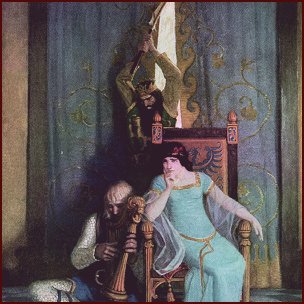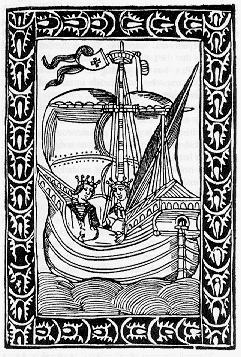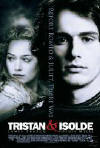English
459 - Love and Death: The Tristan Tradition
 |
Spring,
2016
 Class meetings:
T/Th 2-4, Rm. 14-251 Class meetings:
T/Th 2-4, Rm. 14-251
Office:
47-35G, tel. 756-2636
Office Hours: TR 8:10-9:0,
W 10:10-12:00,
and by appt. |
|
Dr.
Debora B. Schwartz
dschwart@calpoly.edu
Main
English Office: 756-2597
|
|
 |

 Calendar
of Assignments
Calendar
of Assignments
PLEASE NOTE that the on-line syllabus (not any print-out you
may make) is authoritative. Assignments may be modified in the
course
of the quarter. Check the on-line syllabus regularly (before
each
class) to ensure that you are completing the correct assignment.


 COURSE
DESCRIPTION and OBJECTIVES:
COURSE
DESCRIPTION and OBJECTIVES:
ENGL 459, "Love and Death: The Tristan Tradition,"
explores medieval
and modern versions of the first medieval blockbuster, the romance
of Tristan
and Isolde, a love story that has been eclipsed, in modern
Anglo-American
literature, by the better known saga of Lancelot and
Guenevere. We
will trace the development of the Tristan tradition from the
middle ages
to the 21st century, seeking to understand its ongoing appeal and
to analyze
the significance it has held for various periods and
audiences. Of
particular interest will be the author's treatment of the
participants
in the adulterous triangle -- King Mark of Cornwall; Tristan,
Mark's nephew
and Isolde's lover; and Isolde, Tristan's lover and Marc's queen
-- as
well as of peripheral characters such as Brangaine and Isolde of
the White
Hands.
The seminar focuses on the ways in which
various
writers and artists have used the legends to convey different
"meanings."
We will consider artwork, film and an opera in addition
to broad
range of literary works dating from the medieval period through
the 21st
century: medieval romance and lai, Victorian and modern
poetry, modern
and contemporary fiction. We will consider how they are
the products of their specific historical and cultural contexts
and shed
light on the values and goals of the artists which produced them
and the
audiences which enjoyed them.
By the end of the quarter, you
should feel
confident of your ability to locate, access and correctly document
resources
for a literary research project found at Kennedy Library and in
the collections
other research libraries. Finally, I hope
that your
study of medieval and modern Tristaniana will inspire you to
read more
medieval and medieval-themed literature on your own -- or with
me in another
class!

REQUIRED TEXTS: Some required textbooks have been ordered and are
available at the
bookstore. Do NOT substitute another edition or translation
for these
textbooks:
Some required textbooks have been ordered and are
available at the
bookstore. Do NOT substitute another edition or translation
for these
textbooks:
-
Joseph Bédier, The Romance of Tristan and Iseult,
tr. Hilaire Belloc and Paul Rosenfeld (Vintage Classics)
-
Béroul, The Romance of Tristan, tr. Alan S.
Fedrick
(Penguin Classics)
-
Gottfried von Strassburg, Tristan with the Surviving
Fragments of
the Tristan of Thomas, tr. A. Hatto (Penguin
Classics)
-
Chrétien de Troyes, Arthurian Romances, tr.
William
W. Kibler and Carleton W. Carroll (Penguin Classics)
-
John Updike, Brazil (Ballantine)
-
Steven Millhauser, The King in the Tree (Vintage
Books)
Other
required
readings will be accessed electronically, as .HTML files
through links
on this website, or as .PDF files that have been placed on "electronic
reserve" on Polylearn. Please note that ALL required
electronically
accessed readings should be printed out, placed in a course binder,
and
brought with you to class. To
access Polylearn,
log in at MyCalpoly,
go
to "My Courses" and select ENGL 459 from the classes you are taking.
Click
on the PolyLearn link to download, read and/or print the .PDF files
using
Acrobat Reader. To access
online
readings in .html files, click on the link on the Calendar
of Assignments. Please be sure to bring hard copy of
assigned
texts with you to class.

|
|
 REQUIRED
VIDEO SCREENINGS: The curriculum covered
in this course includes
five films which are
on reserve for ENGL 380 and ENGL 459
at the Kennedy Library Circulation Desk:
We will also screen "Extended Scenes" from Richard
Wagner's Tristan und Isolde (the
opera was composed 1857-59;
the DVD
on reserve presents excerpts from the 1976
production starring Jon
Vickers and Roberta Knie, with the Montreal Symphony
Orchestra, under the
baton of conductor Franz-Paul Decker). REQUIRED
VIDEO SCREENINGS: The curriculum covered
in this course includes
five films which are
on reserve for ENGL 380 and ENGL 459
at the Kennedy Library Circulation Desk:
We will also screen "Extended Scenes" from Richard
Wagner's Tristan und Isolde (the
opera was composed 1857-59;
the DVD
on reserve presents excerpts from the 1976
production starring Jon
Vickers and Roberta Knie, with the Montreal Symphony
Orchestra, under the
baton of conductor Franz-Paul Decker).
These required films are the equivalent of
readings and
must be viewed
prior to the class meeting at which they will be
discussed.
NOTE 1: Videos and DVDs on reserve do not
circulate outside the
library; they must be screened in the library during
normal library
hours. Group screenings will be scheduled in
Kennedy Library
and/or at Dr. Schwartz's house (dates and times will be
posted on the course
calendar), or you may see them on your own time.
NOTE 2: Several (but NOT ALL) of the films
may be available
online, from NetFlicks (DVD only) and/or from local
video stores.
NOTE 3: Only selected scenes from the films
will be screened
in class; you must arrange to see the full video
prior to the
class meeting at which it will be discussed.
|

Communicating:
 You
are expected to have an email account and to check it
regularly.
Important announcements will be sent over the class
email
alias.
The class email alias is automatically generated using the email
address
of each enrolled student found in the Cal Poly Directory server.
If your
Cal Poly email account is NOT your preferred email address, you must
You
are expected to have an email account and to check it
regularly.
Important announcements will be sent over the class
email
alias.
The class email alias is automatically generated using the email
address
of each enrolled student found in the Cal Poly Directory server.
If your
Cal Poly email account is NOT your preferred email address, you must
-
Log into http://my.calpoly.edu/
and click on "Grades and Personal Information" (the "Personal
Information
Channel") to change your Email Delivery Address. Once
you have done
so, any email sent to your <username@calpoly.edu>
, including
all postings to the class alias, will be forwarded to the
address you have
designated.
Remember: you are responsible for any information sent over the
class
email alias (e.g. changes in assignments; other class-related
announcements),
so be sure to check your email regularly. You may also use the
alias
to send a query or comment to the whole class (including your
instructor).
Please do not use the alias for matters unrelated to class.


 Attendance
Policy: Due to the twice-weekly seminar
format, any absence
causes you to miss a substantial chunk of material. Regular
and punctual
attendance is required. Please note that EVERY
absence will
affect the participation component
of your
final
course grade.
Attendance
Policy: Due to the twice-weekly seminar
format, any absence
causes you to miss a substantial chunk of material. Regular
and punctual
attendance is required. Please note that EVERY
absence will
affect the participation component
of your
final
course grade.
Each student starts out with a 4.0 for attendance. This
component
of your final grade drops by .3 for the first UNEXCUSED
absence;
the penalty increases by .1 for each subsequent unexcused absence
(from
A [4.0] to A- [3.7] to B+ [3.3], to B- [2.8], etc.).
Additionally,
it drops .1 for the first EXCUSED absence (4.0 to 3.9) and
.2 for
the second excused absence (3.9 to 3.7). Excused
absences
in excess of two (a full week, 10% of the class) count
the same
as unexcused absences.
Please note that only absences resulting from illness, a family
emergency,
or circumstances truly beyond your control count as excused.
Absences
taken for personal convenience are a matter of choice rather than
necessity; they will be recorded as unexcused. Please note
that
deadlines for other courses, work conflicts and job interviews are
NOT
valid reasons for missing class. Exception: a
graduating senior
will be granted ONE excused absence for an out-of-town job
interview.
FOR ANY ABSENCE TO BE EXCUSED, YOU MUST SUBMIT A SIGNED, WRITTEN
NOTE
with course number, date missed and an explanation of the
circumstances
leading to your absence. (Although I do appreciate your
courtesy
in letting me know why you have missed a class, an Email or a
phone message
will not suffice; a written statement with your
signature
is required for an absence to be excused.)

Participation: in addition to
regular class
attendance, the participation component of the class grade will
reflect
two sorts of online participation.
-
You will be assigned to a PolyLearn
discussion
group of 4-6 students to which you will post short
reactions to / reflections
on the assigned readings and films. Each week, you will be
expected
to post a response of at least one paragraph to at least one
assigned reading
or film, and to post a thoughtful response of at least one
paragraph to
at least two of your classmates. These postings will be
graded pass/fail
only and will be factored into the participation portion of your
final
course grade.
-
You are also also expected to collaborate
with
your classmates by submitting research
progress reports and records of works ordered via LINK+
or ILL
to
the class research archive, located in a PolyLearn
"Discussion Board."
There will be separate forums for each author/text.
Additionally, there
will be an ILL Repository to which you will upload
Interlibrary
Loan articles you have received electronically.
Your complete
set of Research Progress Reports
and your
upload(s) to the ILL Repository will factor into the participation
component of your final course grade.
 Preparation:
Preparation:
 Readings listed on the Calendar of Assignments are to be completed
BEFORE
coming to class on the date for which they are assigned.
Readings
are found in the required textbooks, on e-reserve in PolyLearn, or
may
be accessible through a link on the calendar of assignments.
Short
background assignments should normally be read first, since they
provide
a context within which the primary readings will be more
meaningful. But
when time is short, concentrate on getting through the primary
readings
which will be the focus of class discussion; you can always make
up the
background readings later.
Readings listed on the Calendar of Assignments are to be completed
BEFORE
coming to class on the date for which they are assigned.
Readings
are found in the required textbooks, on e-reserve in PolyLearn, or
may
be accessible through a link on the calendar of assignments.
Short
background assignments should normally be read first, since they
provide
a context within which the primary readings will be more
meaningful. But
when time is short, concentrate on getting through the primary
readings
which will be the focus of class discussion; you can always make
up the
background readings later.
Be prepared to discuss readings in class. Note that the length
and difficulty
of assignments vary, so look ahead in the reading list when you
are planning
your time. You will be responsible for ALL the assigned readings,
whether
fully discussed in class or not, as well as for the additional
background
material presented in lectures, online
readings,
or in student presentations and in class discussion.
Finally, get started on your research
early,
even if your presentation date falls towards the end of the
quarter.
To get started, come to an Office Hour
(or make
an appointment to see me) by the end of week 3 at the
latest.
Failure to do so will result in an "F"
being
averaged into the Research Report component of your final
course grade.
We will use this initial meeting to brainstorm, to discuss
possible topics
and approaches, to help you get the hang of some of the library
research tools, and/or simply to get acquainted. After
this initial
meeting, feel free to come back! This means: if you feel
confused
about a research assignment, let me help you troubleshoot!

 GRADED
WORK:
GRADED
WORK:
![Mac Harshberger, [Mark] Watched
Them as They Lay (1927 illustration to Bedier's Romance of
Tristan and Iseult)](MHWatched.jpg) Four
guided research exercises will help you begin your research
for
your oral
presentation and your final
paper. Research progress reports are posted to a class
Research
Archive on each author or film to serve as a "roadmap" for
anyone who
wishes to incorporate the text or film you have researched into
their final
projects. Because your Research Progress
Reports
will be an important resource for your classmates, they factor
into your
participation grade.
Four
guided research exercises will help you begin your research
for
your oral
presentation and your final
paper. Research progress reports are posted to a class
Research
Archive on each author or film to serve as a "roadmap" for
anyone who
wishes to incorporate the text or film you have researched into
their final
projects. Because your Research Progress
Reports
will be an important resource for your classmates, they factor
into your
participation grade.
There will also be two collaborative
forums
where you should post a list of all items you have ordered through
Link+
and an ILL Repository where you will upload Interlibrary
Loan
articles you have received electronically. The ILL
Repository
and the LINK+ Orders forums allow seminar participants to
pool their
resources and "share the wealth" without recalling each other's
books or
wasting the library's limited financial resources by placing
multiple
Interlibrary
Loan and Link+
requests for the same items. Because they are an important
resource
for your classmates, they factor into your participation
grade.

Starting in week three, each reading or film
will
be presented by one or more students (sign-ups the first week of
class).
This ORAL
PRESENTATION (no more than 20 min. per student!) will
be the
starting point for class discussion, led jointly by presenter(s)
and professor.
The Oral Presentation should discuss specific textual passages (or
scenes
in a film) that you find interesting or illuminating. You
may analyze
a particular episode, character, theme or motif; discuss the use
of imagery,
stylistic choices, or structural aspects of the text; or compare
one of
more of these elements with previous readings. In all cases,
the
presentation should be anchored by CLOSE READING of passages from
the text.
If you choose, you may refer in passing to a
secondary source
which you have found particularly interesting or useful, but you
should
NOT do a "book report" on the critics you have found in your
research;
keep the focus on the primary work (literary
text,
artwork or film).
Students are encouraged (but not required) to develop the
presentation
topic more fully in the final research paper.
Please
note: you are NOT expected to become a world expert on your
assigned topic;
you are merely responsible for helping to introduce it to your
classmates!
 Click
on link for ORAL
PRESENTATION SCHEDULE.
Click
on link for ORAL
PRESENTATION SCHEDULE.
On the day of the oral presentation,
Presenters
will prepare and distribute an ANNOTATED
BIBLIOGRAPHY of at least five secondary sources
dealing with the
primary reading/film and/or (for modern works) one or more of its
medieval
sources. The Annotated Bibliography will be
graded
for complete and correct bibliographic
citations; for the distribution of items over the required
types
of sources and modes
of access; and for the expression and quality of the
summary.
Your
Oral
Presentation and
Annotated
Bibliography count toward your in-class
work
grade.
Please note: you will need to start
researching
your topic well in advance of your presentation date in
order to
obtain materials through LINK+
and Interlibrary
Loan. You should meet with Prof. Schwartz
(and other presenters
on same day, if applicable) no later than the third week
of class
for
some research guidance and to discuss the focus of your
presentation (possible
topics, approaches, etc.).
 MIDTERM
EXAM: a closed book,
two-hour exam
in class on day 1 of week 9 (T 5/24). The exam will
consist of
some combination of the following: factual questions (from
lectures, assigned
introductory materials, online readings and handouts, including
film criticism);
chronology of works studied; identification of key characters,
events,
objects and motifs; identification of significant and
representative passages
from readings; choice of essay questions.
MIDTERM
EXAM: a closed book,
two-hour exam
in class on day 1 of week 9 (T 5/24). The exam will
consist of
some combination of the following: factual questions (from
lectures, assigned
introductory materials, online readings and handouts, including
film criticism);
chronology of works studied; identification of key characters,
events,
objects and motifs; identification of significant and
representative passages
from readings; choice of essay questions.
PAPER
PROSPECTUS: Normally ungraded; to be
turned in to
me in class on Th 5/12 or as an emailed Word
attachment
by MIDNIGHT on SUNDAY, 5/15. If submitted
as
an emailed word attachment, please save your document under the
filename
[yourlastname]459prospectus.docx
Your Prospectus must include a working title which clearly
identifies the
work(s) discussed as well as topic of your paper; a fully
articulated thesis
(not just a statement of general topic); a tentative outline of
paper;
and a working bibliography of at least eight sources (alphabetized
and
in correct MLA bibliographic citation format).
NOTE: If an
acceptable Prospectus
is submitted on time, it will be used solely for feedback to
help
you write a stronger final research paper. But if
no prospectus
is submitted or the prospectus does not fulfill the
requirements
of the assignment, it will be graded and will count
for
5% of
your final course grade. In that case ONLY, the Research Paper
component
of your final grade will decrease to 25%. (Note: failure to
submit
a prospectus will result in 5% of your final course grade = F.)
 RESEARCH
PAPER: 12-15 pp. long, citing at
least 6 secondary
sources (Graduate Students: 15-20 pp. and 8 secondary
sources).
Final paper may be connected to
oral presentation.
Worth 30% of final course grade
(except
as noted
above). Unless an extension has
been arranged
in advance, Research Papers (along with the original,
marked
up prospectus) are due in hard copy at our last
class meeting or no later than the night of the final oral
exercise / class dinner on Tuesday, 6/7. Please
email me, also, an electronic copy of your paper, saved as
a .docx file under the file name "[your last
name]459paperS16.docx".
RESEARCH
PAPER: 12-15 pp. long, citing at
least 6 secondary
sources (Graduate Students: 15-20 pp. and 8 secondary
sources).
Final paper may be connected to
oral presentation.
Worth 30% of final course grade
(except
as noted
above). Unless an extension has
been arranged
in advance, Research Papers (along with the original,
marked
up prospectus) are due in hard copy at our last
class meeting or no later than the night of the final oral
exercise / class dinner on Tuesday, 6/7. Please
email me, also, an electronic copy of your paper, saved as
a .docx file under the file name "[your last
name]459paperS16.docx".
FINAL ORAL EXERCISE:
starting
during our scheduled Final Exam time (4-7 PM on Tuesday 6/7/16),
there
will be a required final oral exercise: a brief
presentation to
your classmates of the premise and conclusions of your final
research paper.
While the presentation will be ungraded, failure to complete
the Final
Oral Exercise will result in a grade of "F" being averaged
with your Midterm
Exam score. This required Final
Oral Exercise
will take place at my home. It will be followed by an
(entirely optional!)
celebratory meal.
NOTE: I do not typically include
reading
quizzes in my 400-level seminars. However, should it
become apparent
that students are not keeping up with assigned readings, I
reserve
the right to start! Reading quizzes in my classes typically
consist
of a combination of passage IDs; factual questions (based on
assigned
background readings, as well as character or event IDs); and
content-specific
questions based upon primary material (readings, films and
artwork: significant
plot developments, roles played by various characters, etc.)
There
is typically an element of choice on my quizzes, and they
are typically
unannounced. In the (unlikely) event that reading quizzes
prove necessary,
they will be incorporated into the in-class
work
component of your final course grade.

 Grading:
Grading:
| 20% |
Participation
(including
attendance,
Discussion Board postings, archived
research reports, and uploads to the Class ILL
Repository); please
note that failure to meet with Dr. Schwartz concerning
your research
topic by the end of week three at the latest will
result in an
F being averaged into this
portion of your class
grade! |
 |
| 20% |
In-class
work: equal weight to Oral
Presentation and annotated
bibliography. (Should I determine that reading
quizzes are necessary to ensure class members are
keeping up with assignments,
they will be factored into this portion of the final
grade.) |
| 30% |
Midterm Exam.
NOTE: Failure
to participate in the final oral
exercise will
result in an F being averaged with this grade. |
| 30% |
Research
Paper. NOTE:
If an acceptable
Research
Paper Prospectus is submitted on
time, it will
be considered an ungraded exercise designed solely to
provide feedback
to help you write a stronger final paper. But if the
prospectus submitted
does not fulfill the requirements of the
assignment, or if it is
submitted late, it will be graded and will count
for 5% of your
final course grade. In that case, the research paper
itself will be
worth only 25%. NOTE: Failure to submit a prospectus
will result
in 5% of your final course grade = F!! |

| Research Tools:
|
Tristan
Web Resources:
Tristan Films:
Wagner's Opera:
|
Other
Arthurian Resources:
|





OH MY GOSH . . .
CAN I HANDLE
THIS SEMINAR??
Sure you can -- if you keep up with the readings and don't
put
off starting your research! But DON'T assume that the
class
will "take care of itself." If you have a heavy course-
and/or work-load,
please be sure to budget time for this class . .
. Finally.
. . remember that I LOVE teaching this stuff, and I'm told that my
enthusisam
makes my classes more fun!
And WHAT ABOUT THOSE TWO-HOUR BLOCKS?
Rest assured, we'll take a break each day. Feel free to
bring
along a caffeinated (or non-caffeinated) drink -- whatever it
takes to
keep you alert through two hours. If there is sufficient
interest,
rotating cookie duty will be arranged!
WELCOME, AND ENJOY!!!
Contents of this and all linked pages Copyright Debora B.
Schwartz,
2004-2016
 Return
to Dr. Schwartz's Home Page
Return
to Dr. Schwartz's Home Page
Return
to Dr. Schwartz's Teaching Page

 Class meetings:
T/Th 2-4, Rm. 14-251
Class meetings:
T/Th 2-4, Rm. 14-251




 Some required textbooks have been ordered and are
available at the
bookstore. Do NOT substitute another edition or translation
for these
textbooks:
Some required textbooks have been ordered and are
available at the
bookstore. Do NOT substitute another edition or translation
for these
textbooks:




 You
are expected to have an email account and to check it
regularly.
Important announcements will be sent over the
You
are expected to have an email account and to check it
regularly.
Important announcements will be sent over the  Attendance
Policy: Due to the twice-weekly seminar
format, any absence
causes you to miss a substantial chunk of material. Regular
and punctual
attendance is required. Please note that EVERY
absence will
affect the
Attendance
Policy: Due to the twice-weekly seminar
format, any absence
causes you to miss a substantial chunk of material. Regular
and punctual
attendance is required. Please note that EVERY
absence will
affect the  Readings listed on the Calendar of Assignments are to be completed
BEFORE
coming to class on the date for which they are assigned.
Readings
are found in the required textbooks, on e-reserve in PolyLearn, or
may
be accessible through a link on the calendar of assignments.
Short
background assignments should normally be read first, since they
provide
a context within which the primary readings will be more
meaningful. But
when time is short, concentrate on getting through the primary
readings
which will be the focus of class discussion; you can always make
up the
background readings later.
Readings listed on the Calendar of Assignments are to be completed
BEFORE
coming to class on the date for which they are assigned.
Readings
are found in the required textbooks, on e-reserve in PolyLearn, or
may
be accessible through a link on the calendar of assignments.
Short
background assignments should normally be read first, since they
provide
a context within which the primary readings will be more
meaningful. But
when time is short, concentrate on getting through the primary
readings
which will be the focus of class discussion; you can always make
up the
background readings later.
![Mac Harshberger, [Mark] Watched
Them as They Lay (1927 illustration to Bedier's Romance of
Tristan and Iseult)](MHWatched.jpg)

 Click
on link for
Click
on link for 





 Return
to Dr. Schwartz's Home Page
Return
to Dr. Schwartz's Home Page